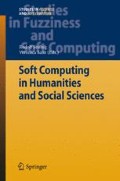Abstract
In this article, we recall different student evaluation methods based on fuzzy set theory. The problem arises is the aggregation of this fuzzy information when it is presented as a fuzzy number. Such aggregation problem is becoming present in an increasing number of areas: mathematics, physic, engineering, economy, social sciences, etc. In the previously quoted methods the fuzzy numbers awarded by each evaluator are not directly aggregated. They are previously defuzzycated and then a weighted mean or other type of aggregation function is often applied. Our aim is to aggregate directly the fuzzy awards (expressed as discrete fuzzy numbers) and to get like a fuzzy set (a discrete fuzzy number) resulting from such aggregation, because we think that in the defuzzification process a large amount of information and characteristics are lost. Hence, we propose a theoretical method to build n-dimensional aggregation functions on the set of discrete fuzzy number. Moreover, we propose a method to obtain the group consensus opinion based on discrete fuzzy weighted normed operators.
Access this chapter
Tax calculation will be finalised at checkout
Purchases are for personal use only
Preview
Unable to display preview. Download preview PDF.
References
Biswas, R.: An application of fuzzy sets in students’ evaluation. Fuzzy Sets and Systems 74(2), 187–194 (1995)
Casasnovas, J., Riera, J.V.: On the addition of discrete fuzzy numbers. Wseas Transactions on Mathematics 5(5), 549–554 (2006)
Casasnovas, J., Vincente Riera, J.: Discrete fuzzy numbers defined on a subset of natural numbers. In: Theoretical Advances and Applications of Fuzzy Logic and Soft Computing. Advances in Soft Computing, vol. 42, pp. 573–582. Springer, Heidelberg (2007)
Casasnovas, J., Vincente Riera, J.: Maximum and Mininum of Discrete Fuzzy numbers. In: Frontiers in Artificial Intelligence and Applications: Artificial Intelligence Research and Development, vol. 163, pp. 273–280. IOS Press (2007)
Casasnovas, J., Vincente Riera, J.: Lattice properties of discrete fuzzy numbers under extended min and max. In: Proceedings IFSA-EUSFLAT, Lisbon, pp. 647–652 (July 2009)
Casasnovas, J., Vincente Riera, J.: Extension of discrete t-norms and t-conorms to discrete fuzzy numbers. In: Fuzzy Sets and Systems, doi:10.1016/j.fss.2010.09.016
Casasnovas, J., Riera, J.V.: Negation functions in the set of discrete fuzzy numbers. In: Hüllermeier, E., Kruse, R., Hoffmann, F. (eds.) IPMU 2010. CCIS, vol. 81, pp. 392–401. Springer, Heidelberg (2010)
Chen, S.-M., Lee, C.-H.: New methods for students’evaluation using fuzzy sets. Fuzzy Sets and Systems 104(2), 209–218 (1999)
Dubois, D., Prade, H.: Fuzzy cardinality and the modeling of imprecise quantification. Fuzzy Sets and Systems 16, 199–230 (1985)
Dubois, D., Prade, H.: Fundamentals of Fuzzy Sets. The handbooks of Fuzzy Sets Series. Kluwer, Boston (2000)
Klir, G.J., Yuan, B.: Fuzzy sets and fuzzy logic (Theory and applications). Prentice-Hall (1995)
Kolesarova, a., Mayor, G., Mesiar, R.: Weighted ordinal means. Information Sciences 177, 3822–3830 (2007)
Marichal, J.-L., Mesiar, R.: Meaningful aggregation functions mapping ordinal scales into an ordinal scale: a state of the art. Aequationes Mathematicae 77, 207–236 (2009)
Mayor, G., Torrens, J.: Triangular norms on discrete settings. In: Klement, E.P., Mesiar, R. (eds.) Logical, Algebraic, Analytic, and Probabilistic Aspects of Triangular Norms. Elsevier (2005)
Mayor, G., Soto, A.R., Suñer, J., Trillas, E.: Multi-dimensional Aggregation of Fuzzy Numbers Through the Extension Principle. In: Data mining, Rough sets and Granular computing. Studies in Fuzziness and Soft Computing, pp. 350–363. Physica-Verlag
Rocacher, D., Bosc, P.: The set of fuzzy rational numbers and flexible querying. Fuzzy Sets and Systems 155, 317–339 (2005)
Voxman, W.: Canonical representations of discrete fuzzy numbers. Fuzzy Sets and Systems 54, 457–466 (2001)
Wang, G., Wu, C., Zhao, C.: Representation and Operations of discrete fuzzy numbers. Southeast Asian Bulletin of Mathematics 28, 1003–1010 (2005)
Wang, H.-Y., Chen, S.-M.: Evaluating Students’Answerscripts Using Fuzzy Numbers Associated With Degrees of Confidence. IEEE Transactions on Fuzzy Systems 16, 403–415 (2008)
Wang, H.-Y., Chen, S.-M.: Appraising the performance of high school teachers based on fuzzy number arithmetic operations. Soft Computing 12, 919–934 (2008)
Wygralak, M.: Fuzzy sets with triangular norms and their cardinality theory. Fuzzy Sets and Systems 124, 1–24 (2001)
Yager, R.R.: Weighted triangular norm and conorm using generating functions. International Journal of Intelligent Systems 19, 217–231 (2004)
Yager, R.R.: Aggregation of ordinal information. Fuzzy Optimization and Decision Making 6, 199–219 (2007)
Zadeh, L.A.: Fuzzy sets. Information and Control 8, 338–353 (1965)
Author information
Authors and Affiliations
Editor information
Editors and Affiliations
Rights and permissions
Copyright information
© 2012 Springer-Verlag Berlin Heidelberg
About this chapter
Cite this chapter
Casasnovas, J., Riera, J.V. (2012). Weighted Means of Subjective Evaluations. In: Seising, R., Sanz González, V. (eds) Soft Computing in Humanities and Social Sciences. Studies in Fuzziness and Soft Computing, vol 273. Springer, Berlin, Heidelberg. https://doi.org/10.1007/978-3-642-24672-2_18
Download citation
DOI: https://doi.org/10.1007/978-3-642-24672-2_18
Published:
Publisher Name: Springer, Berlin, Heidelberg
Print ISBN: 978-3-642-24671-5
Online ISBN: 978-3-642-24672-2
eBook Packages: EngineeringEngineering (R0)

